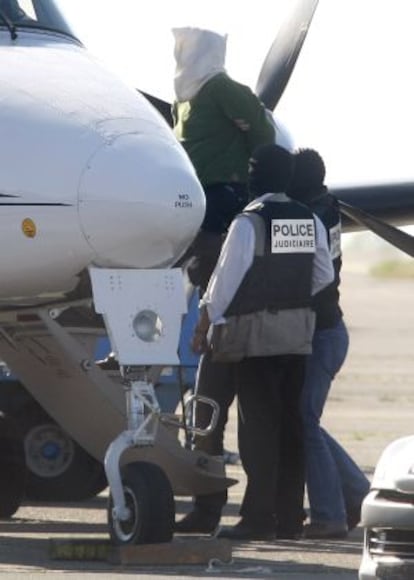How fall of ETA’s last “general” was key to the end of Basque terrorism
Four years have passed since the organization announced a definitive end to violence


The arrest in May 2010 of Mikel Carrera – the man the Civil Guard referred to as ETA’s last “general” – and the rift between the Basque terrorist organization and separatist abertzale politicians were the key factors in the final chapter of the group’s history.
That chapter began with the December 2006 bomb attack at Terminal 4 of Madrid Barajas Airport, which broke the ceasefire reached with the Socialist administration of Prime Minister José Luis Rodríguez Zapatero. It ended with ETA’s declaration of a definitive end to violent activity on October 20, 2011.
Tuesday marks the fourth anniversary of that historic announcement, which came after 43 years of terrorism that left 850 people across Spain dead.
This permanent ceasefire is now considered an irreversible process by security experts. But getting to this point was the result of years of effort by the police, judiciary, society and political parties, including all of Spain’s democratic governments.
Although the Basque terrorist group’s history is well known, its last period of activity is less so, partly because of its proximity in time. The beginning of the end was the 2006 attack on Barajas Airport, which killed two people and created a new rift between ETA and the abertzale left – the traditional supporters of the “armed struggle” who were now keen on channeling their claims through legal political avenues.
The Socialist government opened a breach in ETA convicts’ historical unity, by offering more lenient conditions to those willing to openly reject terrorism
Events really began picking up speed after June 2007, when ETA broke its very last ceasefire. Between then and July 2008, security forces broke up all five ETA cells that had been ready to carry out new attacks. Then, between May and December 2008, three ETA leaderships were arrested in quick succession, including the historical bosses Javier López Peña, “Thierry,” and Mikel Garikoitz Aspiazu Rubina, “Txeroki.”
But there would still be nine more victims to add to the list before ETA finally decided to end its campaign of violence. The last two were Civil Guard officers Carlos Sáenz de Tejada García, 28, and Diego Salva Lezaun, 27, who were murdered in a car bomb attack on July 30, 2009 in Mallorca.
Meanwhile, between June 2007 and October 2011, police arrested 440 ETA members and 110 individuals with ties to the kale borroka acts of street violence committed by Basque nationalist youths, which involved routine acts of vandalism against public buses, bank branches and street furniture.
After that, only remnants of ETA remained.
Former Socialist Interior Minister Alfredo Pérez Rubalcaba notes that “unlike with other ceasefires, during the last one there was more intense police investigation, which became increasingly efficient in coordination with France.”
Luck also played a role, he recalls: in 2010, authorities located a large ETA weapons stash inside a home in the Portuguese town of Obidos, frustrating the group’s attempt to move its infrastructure from France to Portugal, where the police had lately been cracking down on their activities.
That same year, faced with an ultimatum from the Spanish government – “either bombs or votes,” said Rubalcaba – the abertzale left called upon its sympathizers to end their support for terrorism and embrace legal political activities instead.
In February 2010, after securing 80 percent support for this change of tack, radical political leaders began putting pressure on ETA to end its armed activities. But ETA leader Mikel Carrera was disinclined to obey. The government focused on his arrest, which took place in May 2010.
Meanwhile, the Socialist government opened a breach in ETA convicts’ historical unity by offering more lenient conditions to those willing to openly reject terrorism. A few dozen signed up for the program.
A new ceasefire was announced in September 2010, and in January 2011 ETA ended its practice of sending extortion letters to Basque businessmen in order to raise money for its terrorist activities. The street vandalism also ended.
The following month, the abertzale registered a new political party, Sortu, which ran in municipal elections in a coalition of like-minded groups called Bildu. This coalition’s spectacular results at the polls reinforced the message that violence was no longer the way to defend separatist goals in the Basque Country.
A conference was held in San Sebastián that summer to play out the end of ETA, with the participation of several international mediators, including former UN secretary general Kofi Annan.
On October 17, 2011, this conference demanded that ETA announce a definitive end to violence. This occurred three days later in a short public statement.
English version by Susana Urra.
Tu suscripción se está usando en otro dispositivo
¿Quieres añadir otro usuario a tu suscripción?
Si continúas leyendo en este dispositivo, no se podrá leer en el otro.
FlechaTu suscripción se está usando en otro dispositivo y solo puedes acceder a EL PAÍS desde un dispositivo a la vez.
Si quieres compartir tu cuenta, cambia tu suscripción a la modalidad Premium, así podrás añadir otro usuario. Cada uno accederá con su propia cuenta de email, lo que os permitirá personalizar vuestra experiencia en EL PAÍS.
¿Tienes una suscripción de empresa? Accede aquí para contratar más cuentas.
En el caso de no saber quién está usando tu cuenta, te recomendamos cambiar tu contraseña aquí.
Si decides continuar compartiendo tu cuenta, este mensaje se mostrará en tu dispositivo y en el de la otra persona que está usando tu cuenta de forma indefinida, afectando a tu experiencia de lectura. Puedes consultar aquí los términos y condiciones de la suscripción digital.








































